Related Research Articles
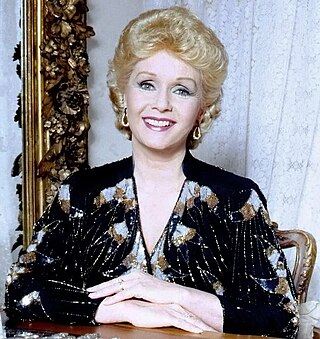
Mary Frances "Debbie" Reynolds was an American actress, singer, and businesswoman. Her career spanned almost 70 years. She was nominated for a Golden Globe Award for Most Promising Newcomer with her portrayal of Helen Kane in the 1950 film Three Little Words. Her breakout role was her first leading role, as Kathy Selden in Singin' in the Rain (1952). Her other successes include The Affairs of Dobie Gillis (1953), Susan Slept Here (1954), Bundle of Joy, The Catered Affair, and Tammy and the Bachelor (1957), in which her performance of the song "Tammy" topped the Billboard music charts. In 1959, she starred in The Mating Game and released her first pop music album, titled Debbie.

Dame Enid Diana Elizabeth Rigg was an English actress of stage and screen. Her roles include Emma Peel in the TV series The Avengers (1965–1968); Countess Teresa di Vicenzo, wife of James Bond, in On Her Majesty's Secret Service (1969); Olenna Tyrell in Game of Thrones (2013–2017); and the title role in Medea in the West End in 1993 followed by Broadway a year later.

Petula Clark CBE is a British singer, actress, and songwriter. She has had one of the longest careers of any British singer, spanning more than eight decades.
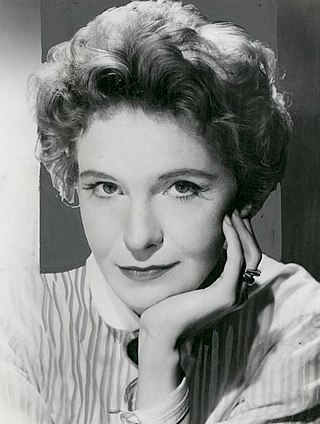
Geraldine Sue Page was an American actress. With a career which spanned four decades across film, stage, and television, Page was the recipient of numerous accolades, including an Academy Award, a British Academy Film Award, two Primetime Emmy Awards, two Golden Globe Awards, and four nominations for the Tony Award.

Gloria Foster was an American actress. She had acclaimed roles in plays In White America and Having Our Say, winning three Obie Awards during her career. Foster played the Oracle in The Matrix (1999) and The Matrix Reloaded (2003) films, the latter film being her last. Foster played the role of the mother of Yusef Bell in the mini series The Atlanta Child Murders which aired in 1985.
Rebecca Louise Front is an English actress, writer and comedian. She won the 2010 BAFTA TV Award for Best Female Comedy Performance for The Thick of It (2009–2012). She is also known for her work in numerous other British comedies, including the radio show On The Hour (1992), The Day Today (1994), Knowing Me, Knowing You… with Alan Partridge (1994), Time Gentlemen Please (2000–2002), sketch show Big Train (2002), and Nighty Night (2004–2005).

Faith Susan Alberta Watson, better known as Alberta Watson, was a Canadian film and television actress.

Lee Strasberg was an American theatre director, actor and acting teacher. He co-founded, with theatre directors Harold Clurman and Cheryl Crawford, the Group Theatre in 1931, which was hailed as "America's first true theatrical collective". In 1951, he became director of the nonprofit Actors Studio in New York City, considered "the nation's most prestigious acting school," and, in 1966, was involved in the creation of Actors Studio West in Los Angeles.
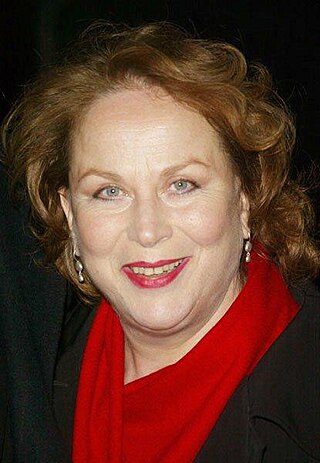
Pamela Ferris is a Welsh actress. She has starred in numerous British television series, including Connie (1985), The Darling Buds of May (1991–1993), Where the Heart Is (1997–2000), Rosemary & Thyme (2003–2006), and Call the Midwife (2012–2016). For her role as Peggy Snow in Where the Heart Is she was nominated three times for Most Popular Actress at the National Television Awards.

Pauline Collins is a British actress who first came to prominence portraying Sarah Moffat in Upstairs, Downstairs (1971–1973) and its spin-off Thomas & Sarah (1979). In 1992, she published her autobiography Letter to Louise.
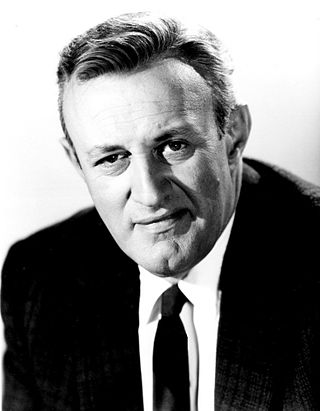
Lee J. Cobb was an American actor, known both for film roles and his work on the Broadway stage, as well as for his television role as the star of the TV series The Virginian. He often played arrogant, intimidating and abrasive characters, but he also acted as respectable figures such as judges and police officers. Cobb originated the role of Willy Loman in Arthur Miller's 1949 play Death of a Salesman under the direction of Elia Kazan, and was twice nominated for the Academy Award for Best Supporting Actor, for On the Waterfront (1954) and The Brothers Karamazov (1958).

Suzanne Pleshette was an American theatre, film, television, and voice actress. Pleshette started her career in the theatre and began appearing in films in the late 1950s and later appeared in prominent films such as Rome Adventure (1962), Alfred Hitchcock's The Birds (1963), and Spirited Away (2001). She later appeared in various television productions, often in guest roles, and played Emily Hartley on The Bob Newhart Show from 1972 until 1978, receiving several Emmy Award nominations for her work.

Elizabeth Mary Driver, was a British actress and singer, best known for her role as Betty Williams in the long-running ITV soap opera, Coronation Street, a role she played for 42 years from 1969 to 2011, appearing in 2732 episodes. She had previously appeared as Mrs Edgley in Coronation Street spin-off Pardon the Expression (1965–1966) opposite Arthur Lowe. In her early career she was a singer, appearing in musical films such as Boots! Boots! (1934), opposite George Formby, and in Penny Paradise (1938), directed by Carol Reed. She was made an MBE in the 2000 New Year Honours.
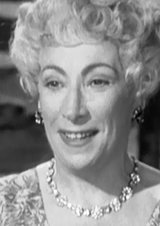
Martita Edith Hunt was an Argentine-born British theatre and film actress. She had a dominant stage presence and played a wide range of powerful characters. She is best remembered for her performance as Miss Havisham in David Lean's Great Expectations.

Lee Ann Meriwether is an American actress, former model, and the winner of the Miss America 1955 pageant. She has appeared in many films and television shows, notably as Betty Jones, the title character's secretary and daughter-in-law in the 1970s crime drama Barnaby Jones starring Buddy Ebsen. The role earned her two Golden Globe Award nominations in 1975 and 1976, and an Emmy Award nomination in 1977. She is also known for her portrayal of Catwoman, replacing Julie Newmar in the film version of Batman (1966), and for a co-starring role on the science fiction series The Time Tunnel. Meriwether had a recurring role as Ruth Martin on the daytime soap opera All My Children until the end of the series in September 2011.

Ruth Elizabeth Warrick was an American singer, actress and political activist, best known for her role as Phoebe Tyler Wallingford on All My Children, which she played regularly from 1970 until her death in 2005. She made her film debut in Citizen Kane, and years later celebrated her 80th birthday by attending a special screening of the film.
Sally Davis, known professionally as Sally Bretton, is an English actress. She is best known for appearing as Lucy Adams in the long-running BBC television sitcom Not Going Out since 2007, and as Martha Lloyd in the BBC1 crime drama Death in Paradise between 2016 and 2017, a role she reprised in the spin-off Beyond Paradise in 2023.

Strange Paradise is a Canadian occult-supernatural soap opera of 195 episodes, initially launched in syndication in the United States on September 8, 1969, and later broadcast on CBC Television from October 20, 1969, to July 22, 1970. The production was the brainchild of producer Steve Krantz, in an attempt to capitalize on the phenomenal success of ABC's daytime serial Dark Shadows in America. To develop the series, Krantz hired actor-writer Ian Martin and veteran TV and radio producer Jerry Layton, both of whom were given screen credit for the creation of Strange Paradise. With the CBC and American broadcasters Metromedia and Kaiser Broadcasting handling distribution and co-production, the series was filmed in Ottawa, Ontario, at CTV affiliate CJOH-TV and aired for 39 weeks, presenting three separate 13-week story arcs.
Antoinette Bower is a British-American retired film, television and stage actress, whose career lasted nearly four decades.
Jack Creley was an American-born Canadian actor. Although most prominently a stage actor, he also had film and television roles.
References
- ↑ "Cosette Lee: A 'Character' and her career, from Peter Pan to television," CBC television network information services press release, typescript dated 21 January 1966, Cosette Lee Collection, Toronto Public Library
- ↑ "... to the Royal Family," Toronto Globe and Mail, 27 June 1972
- 1 2 "TV star lives contented life in Willowdale," The Enterprise (Willowdale, Ontario), 15 November 1967, page 4.
- ↑ "Crest Theatre Regular in Theatre 40 years,"by David Cobb, Toronto Star, 8 January 1963. I am very much indebted to Curt Ladnier for his kindness in sharing this valuable reference.
- ↑ Cosette continued to work occasionally in radio in her later career. She can be heard in a 1968 radio adaptation of the W. W. Jacobs tale "The Monkey's Paw" on CBC Mystery Theatre, a series which can be heard via streaming or download on various websites. Cosette showed a very different side of her craftsmanship in her role as the Mother in this short play. I appreciate Curt Ladnier's kindness in sharing this reference with me.
- ↑ Unidentified newspaper clipping "Loves playing 'Maggie Hatch,' says actress Cosette Lee," dated 7 Dec. 1967, in Cosette Lee Scrapbook, pages 200-201, Cosette Lee Collection, Toronto Public Library.
- ↑ "Crest Theatre Regular in Theatre 40 years," by David Cobb, Toronto Star 8 January 1963.
- ↑ Toronto Globe and Mail review, clipping from Cosette Lee's scrapbooks preserved in her Collection at the Toronto National Library.
- ↑ "Eye Opener presents trial". Ottawa Citizen . 26 February 1965. p. TV Weekly 7. Retrieved 13 August 2010.
- ↑ Cosette Lee Collection, Inventory, and notes by S. R. Shutt from materials housed in the Cosette Lee collection in Toronto.
- ↑ Book held in the personal library of S. R. Shutt. Scans of the cover are widely featured on various blogs and websites.
- ↑ Sid Adilman, "TV's Colin Fox and Strange Paradise, " Toronto Telegram, 29 Nov. 1969
- ↑ "...to the Royal Family," Toronto Globe and Mail, 27 June 1962.
- ↑ "Deranged: Confessions of a Necrophile". imdb.com. Retrieved 27 July 2010.
- ↑ "Archival Collections : Special Collections & Rare Books".